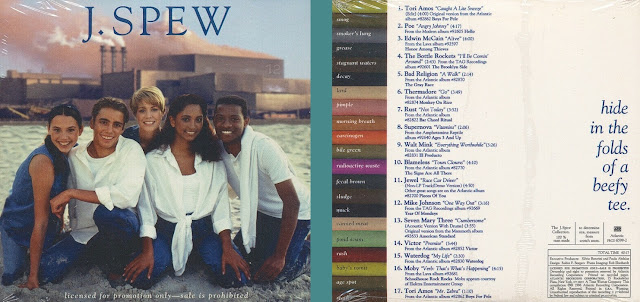Little Earthquakes
Tori Amos (1992)
The word "genius" is used quite a bit, but it's a fitting word to describe Tori Amos. At the age of two, she was able to reproduce songs on the piano after hearing them only once, and she began composing her first original works one year later. At five years old, she enrolled at the Peabody Conservatory of Music on a full scholarship as the youngest student ever admitted to the school. She continued her study of classical piano at the school for the next seven years until she was asked to leave as 11 years old girl, largely due to her desire to study John Lennon and Paul McCartney as composers, and her preference for the music of The Beatles, The Rolling Stones, Stevie Wonder, Carole King and Joni Mitchell over the classical composers that were the focus of the curriculum.
She got her start as a professional performer at age 13 by performing at various gay bars in and around Washington DC from 1972 to 1984 when she moved to Los Angeles to pursue her career in music. Her success came in the early 1990's when she decided to break away from working in bands. Her debut album as a solo performer, Little Earthquakes, was recorded in 1990 and 1991, and was released to widespread critical acclaim 30 years ago today on January 6th, 1992. In 2005, it was named by Rolling Stone magazine as one of the 500 greatest albums of all time.
Anyway, there was a music store in my hometown called Gallery Of Sound that I visited whenever I could. The manager used to put last month's magazines and demo CDs on a little windowsill near the front door which were free for anybody to take. I can't even begin to guess how many different bands and artists I was exposed to as a result of this, but I know that Tori Amos was one of them. Two songs off of her 1996 album Boys For Pele were the bookends for an Atlantic Records demo compilation called J. Spew. I think the cover was supposed to be a parody of a J. Crew catalog, but the joke fell completely flat on me. There's a lot of pretty great music on here, including songs by Poe, Bad Religion, Supernova, Jewel, Seven Mary Three and Moby. I probably played this free CD more times than a lot of the albums that I bought over the years, but even if it stopped after the first track, I would have been glad to have it because it opened a door for me to the incredible music of Tori Amos.


